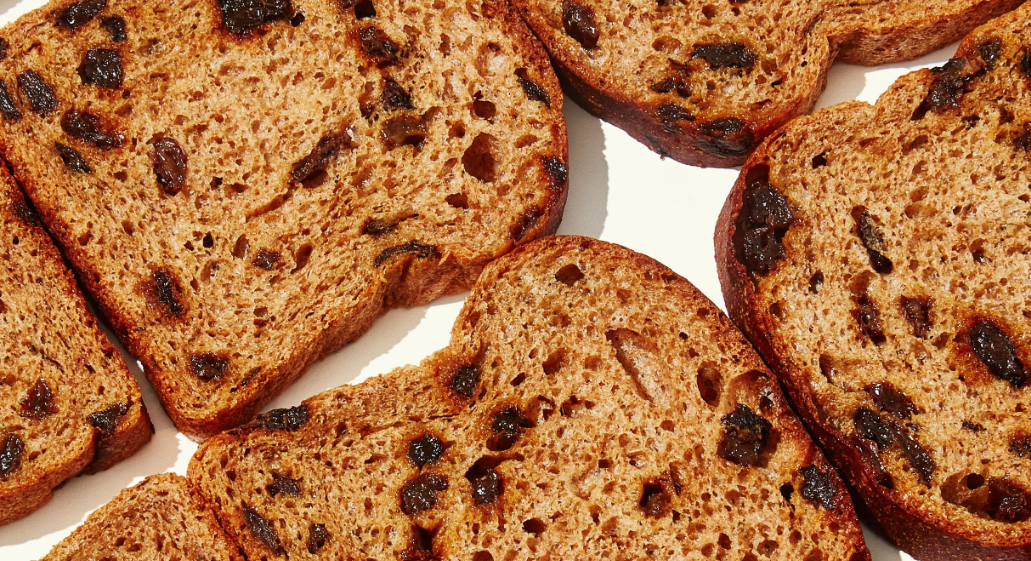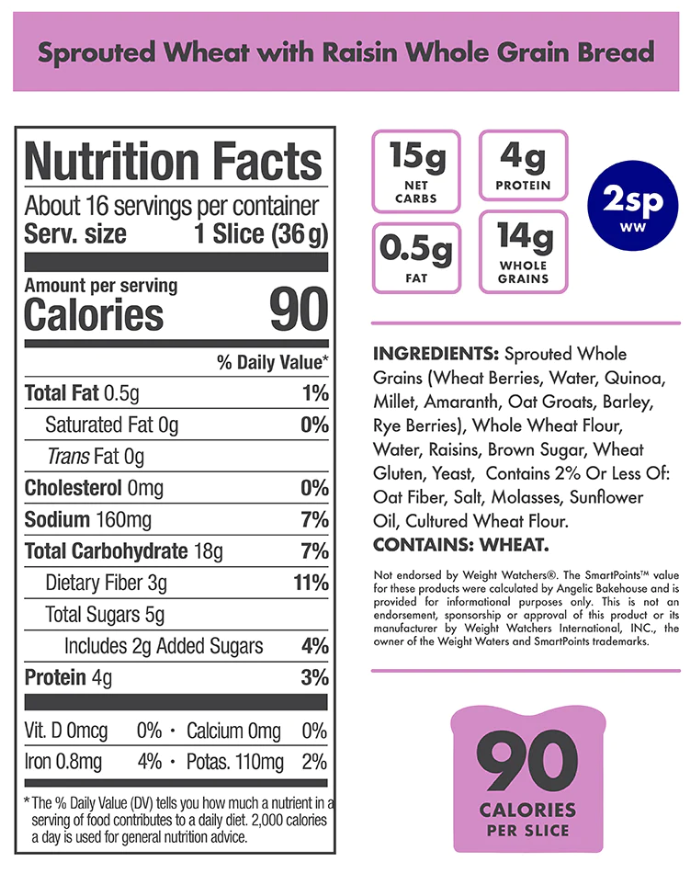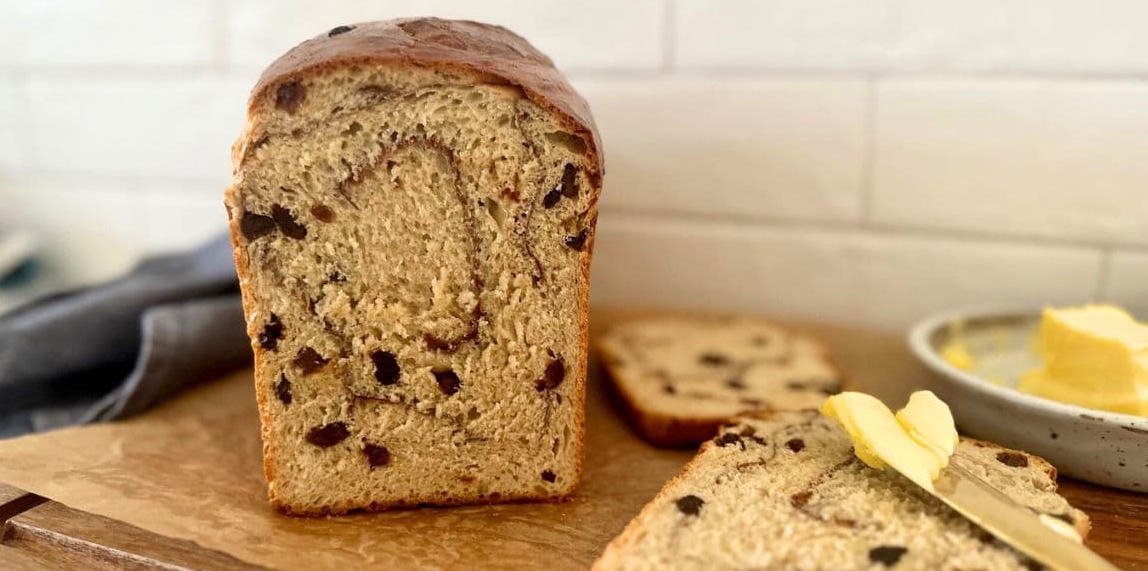Approved By » Esther Howard (Nutritionist) & Dr. Jane Cooper (Expert Dietitian)
For many of us, a thick slice of warm, fragrant raisin bread is the ultimate morning comfort. The sweet, chewy raisins nestled within soft, pillowy dough provide a delightful contrast of flavors and textures.
But beyond its undeniable deliciousness, is raisin bread good for you?
As a registered dietitian, I’m frequently asked about the health implications of enjoying this beloved breakfast bread.
The truth is, the answer isn’t a simple yes or no – the nutritional value of raisin bread can vary quite a bit depending on the specific ingredients and how it’s made.
In this in-depth article, we’ll dive into the potential health benefits, as well as some potential drawbacks, of incorporating raisin bread into your diet.
The Short Answer
Yes, raisin bread can be a good part of your diet. It’s packed with antioxidants from raisins, which are good for your body. It also has dietary fiber that aids digestion, and it provides essential vitamins and minerals. However, it’s high in carbohydrates and its nutritional value can vary based on the ingredients used.
What is Raisin Bread Exactly?
Raisin bread is a type of yeast bread made with, you guessed it, raisins.
The basic recipe typically includes wheat flour (often whole wheat), raisins, water, yeast, and a touch of sweeteners like honey or brown sugar.
Some variations may also include additional ingredients like cinnamon, nuts, seeds, or even a hint of orange zest.
The raisins provide a natural sweetness and chewy texture that sets raisin bread apart from other more standard breakfast breads.
When the raisins are baked into the dough, their sugars caramelize, creating a delightful depth of flavor.

Raisin bread has been a beloved breakfast and snack staple for generations, enjoyed across many different cultures.
From the classic cinnamon-raisin loaf to artisanal sourdough raisin bread, there are countless delicious iterations of this comforting baked good.
Nutritional Profile of Raisin Bread
When it comes to the nutritional value of raisin bread, the specifics can vary quite a bit depending on the recipe and manufacturing process.
However, we can take a look at the general nutrient breakdown of a typical slice:
- Calories: 90-110 calories per slice
- Carbohydrates: 18-22 grams (mostly from the raisins and flour)
- Fiber: 2-4 grams
- Protein: 3-5 grams
- Fat: 1-2 grams

In addition, a serving of raisin bread will provide small amounts of various vitamins and minerals, including:
- Iron
- Calcium
- Magnesium
- Phosphorus
- B Vitamins (thiamin, niacin, B6, folate)
The nutritional profile is largely influenced by the type of flour used (whole wheat vs. refined), the amount of raisins, and any additional ingredients like nuts or seeds.
Commercially produced raisin bread may also contain added sugars, preservatives, or other additives that can impact the overall healthfulness.
Health Benefits of Raisin Bread
So with that nutritional overview in mind, let’s take a closer look at the potential health advantages of enjoying raisin bread as part of a balanced diet:
Antioxidant Power
Raisins are an excellent source of antioxidants, including polyphenols like resveratrol. These antioxidant compounds help neutralize harmful free radicals, reducing oxidative stress in the body.
When raisins are baked into bread, these beneficial plant compounds are carried over, providing an extra layer of antioxidant protection.
Some research has even suggested that the antioxidant activity of raisins may be higher than that of fresh grapes. This is likely due to the concentration that occurs during the drying process.
So in that sense, raisin bread could be considered a mini antioxidant boost for your day.
Anti-Inflammatory Benefits
In addition to their antioxidant properties, the compounds in raisins also exhibit anti-inflammatory effects.
Chronic inflammation is at the root of many serious health conditions, from heart disease to type 2 diabetes.
By regularly enjoying raisin bread, you may be providing your body with natural compounds that help tamp down harmful inflammation.

Improved Heart Health
The whole grains typically found in raisin bread may help support cardiovascular health in a few key ways.
Whole grains are rich in soluble fiber, which has been shown to help lower LDL (“bad”) cholesterol levels and reduce the risk of heart disease.
Furthermore, the antioxidants and anti-inflammatory compounds in raisins themselves may also provide additional heart-protective benefits.
Some studies have linked raisin consumption to improved blood pressure and better blood vessel function.
Better Digestion
Raisins are a great source of dietary fiber, with about 3 grams per quarter-cup serving.
When incorporated into raisin bread, this fiber content can help promote regular bowel movements and prevent constipation.
Fiber also plays a role in stabilizing blood sugar levels and supporting the overall health of the gut microbiome.
For those with certain digestive conditions like irritable bowel syndrome (IBS), the fiber and natural sugars in raisin bread may provide soothing relief.
Of course, it’s always a good idea to check with your healthcare provider before making significant changes to your diet, especially if you have a pre-existing GI issue.
Weight Management Support
The fiber and protein in raisin bread can help promote feelings of fullness and satiety, which may in turn support healthy weight management efforts.
When you feel more satisfied after eating a slice, you’re less likely to experience hunger pangs or uncontrolled snacking.
Additionally, the natural sweetness from the raisins may help curb sugar cravings, preventing you from reaching for less nutritious refined carbohydrates.
As long as you practice portion control and pair raisin bread with other satiating, high-protein foods, it can be a smart choice as part of an overall balanced diet.

Potential Downsides of Raisin Bread
While the health benefits of raisin bread are compelling, it’s important to acknowledge that there are also some potential drawbacks to be aware of:
Calorie and Carbohydrate Density
As mentioned, raisins are a calorie-dense food, packing about 100 calories per quarter-cup serving.
And when those raisins are baked into bread, the final product can be surprisingly high in calories and carbohydrates per slice.
For example, a typical slice of raisin bread can contain 90-110 calories and 18-22 grams of carbs.
This means that it’s easy to overdo it on the raisin bread if you’re not mindful of portion sizes, especially for those watching their weight or managing blood sugar levels.
Added Sugars
While the natural sugars found in raisins aren’t necessarily a problem, some commercial raisin bread recipes may contain additional refined or added sugars.
These can come in the form of white sugar, brown sugar, honey, or high fructose corn syrup.
Too much added sugar intake has been linked to an increased risk of obesity, type 2 diabetes, and heart disease.
When selecting raisin bread, it’s important to check the nutrition label and ingredient list carefully.
Opt for options that minimize or eliminate added sugars, relying more on the natural sweetness of the raisins themselves.
Wheat/Gluten Sensitivities
For individuals with celiac disease, non-celiac gluten sensitivity, or wheat allergies, standard raisin bread made with wheat flour would not be an appropriate choice.
The gluten and wheat content could trigger uncomfortable and potentially dangerous symptoms.
Thankfully, there are now gluten-free and wheat-free versions of raisin bread available for those with dietary restrictions.
Just be sure to check the packaging carefully to ensure the recipe is safe for your individual needs.
Dental Health Concerns
The sticky, chewy texture of raisins means they can cling to teeth for longer periods compared to other foods.
This prolonged contact with tooth enamel increases the risk of dental cavities, especially if oral hygiene habits are lacking.
To mitigate this potential downside, it’s important to practice good dental hygiene – brushing, flossing, and rinsing thoroughly – after enjoying a slice of raisin bread.
Chewing sugar-free gum may also help stimulate saliva flow and dislodge any lingering raisin bits.
How to Choose the Healthiest Raisin Bread
With both the benefits and potential drawbacks in mind, how can you identify the most nutritious raisin bread options? Here are some tips:
- Look for Whole Grains: Opt for raisin bread made with 100% whole wheat flour or other whole grain flour like spelled or oat. Avoid refined white flour, which has had the nutrient-dense germ and bran removed.
- Check the Sugar Content: Scan the nutrition label and ingredients list to ensure the bread doesn’t contain excessive amounts of added sugars, whether that’s white sugar, brown sugar, honey, or syrups. Stick to raisin bread that relies primarily on the natural sweetness of the raisins themselves.
- Consider the Raisin Ratio: The more raisins a loaf of bread contains, the more nutritional benefits it will provide. Look for raisin bread where the raisins are evenly distributed throughout, rather than just a sprinkling.
- Avoid Unnecessary Additives: Steer clear of raisin bread that contains a long list of hard-to-pronounce ingredients, preservatives, or artificial colors/flavorings. The fewer the ingredients, the better.
- Bake Your Own: For ultimate control over the quality and nutrition, consider baking your raisin bread at home. This allows you to customize the recipe to your preferences and dietary needs.
- Pair it Mindfully: Finally, be mindful of your portion sizes and how you enjoy raisin bread. Pair a single slice with protein, healthy fats, and/or fresh produce to create a balanced, nutrient-dense meal or snack.
Raisin Bread and Special Dietary Needs
For individuals with certain health conditions or dietary restrictions, the question of whether raisin bread is a good choice becomes a bit more nuanced. Let’s look at a few specific scenarios:
Is Raisin Bread Good for Diabetics?
The high carbohydrate and natural sugar content of raisins means raisin bread may not be the best option for those with diabetes.
However, some people with diabetes can still enjoy it in moderation as part of a balanced meal plan. The key is to pair raisin bread with protein and healthy fats to help blunt the blood sugar spike.
It’s also important to choose raisin bread that minimizes added sugars and opts for whole grain flour. Working closely with a registered dietitian can help determine the appropriate portion size and frequency for your individual needs.
Celiac Disease/Gluten Sensitivity
For individuals with celiac disease or non-celiac gluten sensitivity, standard raisin bread made with wheat flour is completely off-limits. Consuming gluten can trigger uncomfortable gastrointestinal symptoms and intestinal damage.
Fortunately, there are now many gluten-free raisin bread options available, made with alternative flours like almond, coconut, or gluten-free oat flour. These can provide the familiar taste and texture of raisin bread without the problem of gluten.
Nut/Seed Allergies
Some variations of raisin bread may contain nuts, seeds, or nut/seed kinds of butter.
If you have a known allergy to any of these ingredients, be sure to thoroughly check the label and ingredient list before purchasing or consuming raisin bread.
Opt for plain raisin bread without any added nuts or seeds, or explore homemade versions where you can control the recipe.
As with any food, those with dietary restrictions or health conditions must work closely with their healthcare team to determine the best and safest choices.
With a little label-reading and recipe modification, raisin bread can potentially be enjoyed by many, even with specialized dietary needs.
The Bottom Line: Is Raisin Bread Good for You?
The answer is a qualified yes. When made with high-quality, minimally processed ingredients, raisin bread can be a nutritious and delicious part of an overall healthy diet.
The raisins provide an array of antioxidants, fiber, and other beneficial plant compounds. And the whole grain flour used in many varieties offers additional nutritional advantages.
However, it’s important to be mindful of portion sizes and keep an eye out for added sugars or other less-healthy ingredients that can detract from the nutritional value. As with any food, moderation and balance are key.
For those who can safely enjoy it, raisin bread makes an excellent breakfast or snack option.
Just be sure to pair it with other nutrient-dense foods like yogurt, nut butter, or fresh fruit to create a complete, satisfying meal.
And don’t be afraid to experiment with homemade versions to have full control over the ingredients.
Disclaimer: Always consult with a healthcare professional before making significant dietary changes. Individual needs may vary.

